
Nazi Film Melodrama
Nazi Film Melodrama
LAURA HEINS
University of Illinois Press
URBANA, CHICAGO, AND SPRINGFIELD
2013 by the Board of Trustees
of the University of Illinois
All rights reserved
Manufactured in the United States of America
1 2 3 4 5 C P 5 4 3 2 1
 This book is printed on acid-free paper.
This book is printed on acid-free paper.
Library of Congress Cataloging-in-Publication Data
Heins, Laura.
Nazi film melodrama / Laura Heins.
pages cm
Includes bibliographical references and index.
ISBN 978-0-252-03774-0 (hardcover : alk. paper)
ISBN 978-0-252-07935-1 (pbk. : alk. paper)
ISBN 978-0-252-09502-3 (e-book)
1. National socialism and motion pictures. 2. Motion picturesGermanyHistory. 3. Melodrama in motion pictures. I. Title.
PN1995.9.N36H45 2013
791.43028092243dc23 2012045134
Contents
Epilogue. Reprivatization after Nazi Cinema:
Postwar German Melodrama
Acknowledgments
I deeply appreciate all the support I have received over the years in completing this project. I am indebted to Brigitte Peucker, from whose teaching my idea for this book first arose, for her feedback on my writing and for her valuable professional assistance and advice. I am grateful to Katie Trumpener for reading my work and giving me much needed encouragement at a crucial stage in this project. My gratitude also goes to Lutz Koepnick and Marc Silberman, who provided very useful commentary on my manuscript, and to Katerina Clark for reading an earlier version of my text. I give my thanks to Lorna Martens for her mentorship, and to Johannes Evelein, Hector Amaya, Jeffrey Grossman, Volker Kaiser, and Andrea Press for their professional support. I would also like to acknowledge Gertrud Koch, who enabled me to spend a year at the Freie Universitt Berlin, as well as Noa Steimatsky for first inspiring my interest in melodrama. I am grateful to Daniel Nasset at the University of Illinois Press for his support of this project and his always helpful and efficient editorial work.
I was fortunate to receive a generous grant from the Deutscher Akademischer Austauschdienst to visit the FU Berlin and to access rare materials in Germany. The University of Virginia granted me a sabbatical from teaching that allowed me to complete this book. Thanks to Wolfgang Theis at the Deutsche Kinemathek for his friendly assistance in locating images for the manuscript. I would also like to thank Ms. Klawitter, Ms. Okrug, and all of the other archivists who assisted me during multiple visits to the Bundesarchiv, as well as the staff of the media archive at the FU Berlin.
For so much personal support over the years, I give special thanks to my family: Joel Heins, Geraldine Gail, Margaret Parks, and Michael Ehresman. For their friendship, I thank Dan Easton, Elizabeth Floyd, Christina Gebhard, Kate Holland, Irina Kuznetsova, Patrick Macias, and Mary Katharine Tramontana. For both her friendship and her advice on this project, I am especially grateful to Masha Salazkina. For his affection and encouragement as I was completing this book, I give warm thanks to Daniel Halbheer.
Nazi Film Melodrama
Introduction
Melodrama in the Nazi Cinema: The Domestic War
The Nazi film industry, although the weapon of a regime founded on brutal militarism, produced at least ten times more domestic and romance melodramas than war films. Cinema was highly instrumentalized in the Third Reich, yet at first glance the chosen forms for the transmission of Nazi ideology may not always appear logical. How can the intense focus on the private sphere, intimate relations, female protagonists, and love in the cinema of a masculine, genocidal, imperialist state be explained? Why would the Nazis invest so heavily in a genre that, as Laura Mulvey has stated, revolves so openly around sexuality and emotion if the ultimate goal was to form a disciplined subject whose individual desires were completely sublimated and subjugated to the needs of the state?
The most immediate answer is surely the fact that ideological work on the private, individual needs of the citizens of the Third Reich was crucial to the functioning of the Nazi system as a whole. Viewed within a totalizing model of this system, it seems evident that the emotional framework of the individual had to be continually readjusted for the fascist machine to operate; as Herbert Marcuse argued while observing Nazi Germany from exile in 1942: In National Socialist Germany, all men are the mere appendices of the instruments of production, destruction and communication, and although these human appendices work with a high degree of initiative their individual performances are entirely adjusted to the operation of the machine Morale has become a part of technology.functioning totalitarian system and that its morale machine sometimes malfunctioned or began to move in unintended directions.
For these reasons, this study focuses primarily on the systematic intentions built into the Nazi melodrama while also revealing its malfunctions. Throughout we will see that sexuality and emotion were particular obsessions of the leaders of Nazi culture, highly problematic issues that required continual readjusting and maintenance on the screens of Third Reich cinemas. Among the tasks of film melodrama in the Nazi state, I propose, were the following: the management of spectator desire through a planned deployment of the erotic, the creation of discourses of liberation to sell images of the Reich nationally and abroad, and the weakening of nineteenth-century codes of morality in favor of revised gender and familial relations to support the future functioning of an imperialist order. As I aim to show, Nazism made appeals to antibourgeois sentiment and attempted to initiate a reorganization of private life while suggesting that domestic concerns must submit to expansionist aspirations. But some elements of tradition stood in the way of German fascisms version of modernization, and challenges surrounding sexuality continually reappeared. The domestic war in the title of this introduction thus refers both to the mediation between civilian life and front warfare and to the struggle over domesticity within German fascist culture, battles that left their marks in melodramatic films.
When considering the affinity of the melodramatic mode to propagandistic rhetoric, the Third Reich film industrys interest in melodrama does appear to be a logical choice. Melodrama, in its most classic form, is a binary mode in which narratives and characters alternate between action and pathos, between vengeance and the submission to fate. Like propaganda, melodrama describes conflict in a polemical manner, avoiding elaboration of the low-contrast shades of facts and details. Melodramas engagement of basic emotions and its condensation of social and economic difference into personal conflict allow for an effective emotional appeal to the spectator. Film melodrama was thus a crucial instrument for adjusting the internal functions of Third Reich audiences. Stories of private life work on normative systems, and melodrama can therefore be used to diffuse emotionally charged morals that act as models for living and contribute to action in the public sphere. As Peter Brooks has argued, melodrama becomes particularly relevant at historical junctures in which marked ideological conflicts must be resolved, and it does so by defining a system of values that achieves a quasi-religious significance: the moral occult.when traditional religious forms are to be replaced with revolutionary values. Among other uses, the Nazis employed the melodramatic weapon in their attempts to usurp the popular authority of Catholicism.
Next page
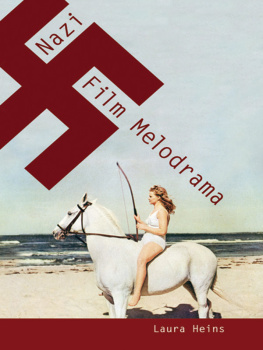
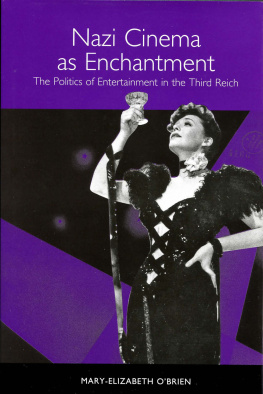
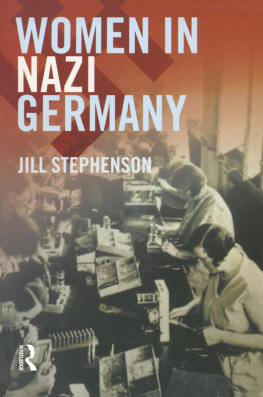

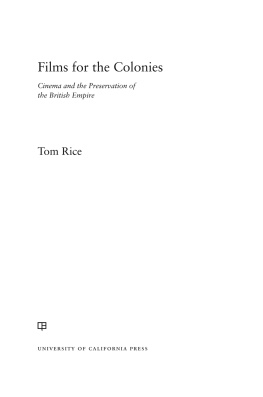
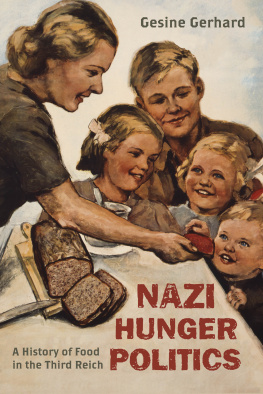
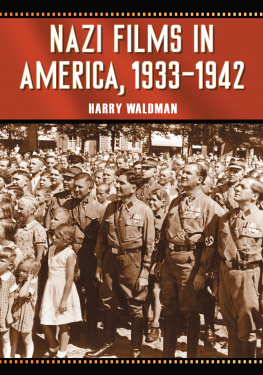

 This book is printed on acid-free paper.
This book is printed on acid-free paper.